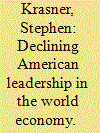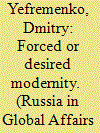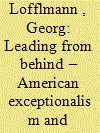| Srl | Item |
| 1 |
ID:
170461


|
|
|
|
|
| Summary/Abstract |
Although American leadership of NATO had been a constant over the entire postwar period, after the Soviet threat evaporated in the 1990s Americans began a process of reassessing the necessity and desirability of this leadership as well as the American return on its investment in NATO. Europeans, in turn, enjoyed a policy emancipation allowing them to follow the U.S. lead, resist (or reject) it when American policies violated European interests or, as a precautionary measure in the event of American abandonment, acquire strategic autonomy within the European Union. The persistence and credibility of American leadership of NATO after Kosovo, as well as episodic European challenges within and outside NATO, cannot be understood without reference to the structural and institutional factors preventing the American abdication of its leadership role within NATO or the European ability to reject it unconditionally. I find that material conditions for American leadership remain unimpaired, but the credibility of American leadership as it pertains to the confidence the allies have in U.S. willingness to fulfill its Article 5 commitment has suffered potentially irreversible damage. Yet it is institutional factors, particularly the institutional stickiness bonding the American foreign policy elite to a NATO-centric security system and the positive externalities attending institutional negentropy, that have played an outsized role in maintaining NATO’s cohesion and legitimacy. They have also raised the cost of substituting European strategic autonomy for American leadership or the abandonment of it. The Europeans have sought a precautionary defense autonomy to cope with non–Article 5 threats of peripheral interest to the United States but they have remained willing to follow the American lead on matters touching collective defense and deterrence in Europe. Future American grand strategy, currently undergoing vigorous debate inside and outside government, will have a fundamental impact on NATO’s centrality to U.S. foreign policy calculations as well as the desirability or necessity of U.S. leadership, independent of a European desire for or acquisition of strategic autonomy. The choice of strategy poses the greatest threat to NATO’s long-term cohesion, American willingness to remain entangled in European affairs, and American leadership in Europe.
|
|
|
|
|
|
|
|
|
|
|
|
|
|
|
|
| 2 |
ID:
176433


|
|
|
|
|
| Summary/Abstract |
IN 1853, American diplomats appeared in suits rather than court uniforms at a reception in Berlin. Their perplexed Prussian counterparts asked why they were dressed in black like undertakers. “We could not,” one American official quipped, “be more appropriately dressed than we are, at European courts, where what we represent is the burial of monarchy.”
|
|
|
|
|
|
|
|
|
|
|
|
|
|
|
|
| 3 |
ID:
142895


|
|
|
|
|
| Summary/Abstract |
For the last twenty or more years, international relations scholarship in the United States has been dominated by two competing research programs – liberalism and realism. Each of these programs has had many specific variations. The adherents of each perspective have disagreed among themselves as well as with those holding the other view. Each of these broad perspectives, however, shares basic assumptions about the nature of actors, the character of the international system and the prospects for cooperation. For liberalism there is a multiplicity of actors; cooperation is likely if not foreordained because these actors pursue absolute not relative goals; they function in a mixed-motive, not a zero-sum world. Order con emerge from the self-interested behavior of individuals, though international institutions might be necessary to facilitate cooperation under conditions of market failures.
|
|
|
|
|
|
|
|
|
|
|
|
|
|
|
|
| 4 |
ID:
100599


|
|
|
| 5 |
ID:
132439


|
|
|
| 6 |
ID:
138979


|
|
|
|
|
| Summary/Abstract |
This article explores the discursive performance and political significance of ‘American exceptionalism’ under President Obama. Moving beyond a critical examination of geopolitical identity, it investigates how representations of exceptionalism, understood as ideational construct of uniqueness and superiority, are linked to practices of US foreign and security policy that confirm, but also contest, established notions of American leadership in world politics. A particular focus lies on the 2012 presidential campaign, and how diverging ‘exceptionalist’ visions between Obama and Mitt Romney testified to competing ideas for American primacy and cooperative engagement. The article will further examine the cases of ‘leading from behind’ in Libya, American non-intervention against Assad in Syria, and US reactions to current crises concerning Ukraine and ISIS. The contextualisation of these episodes in contemporary, geopolitical discourse reveals how the practice of US foreign and security policy under Obama is shaped by a conflicted and paradoxical vision of post-American hegemony.
|
|
|
|
|
|
|
|
|
|
|
|
|
|
|
|
| 7 |
ID:
123081


|
|
|
|
|
| Publication |
2012.
|
| Summary/Abstract |
REGINA KARP looks at the relationship between nuclear disarmament and world order. She argues that the new security environment compels a reassessment of how national security and international security governance are balanced. She concludes that sustainable arms control and disarmament initiatives involve a debate about who makes the rules and the benefits that come to those who live by them.
|
|
|
|
|
|
|
|
|
|
|
|
|
|
|
|
| 8 |
ID:
127172


|
|
|
| 9 |
ID:
111120


|
|
|
|
|
| Publication |
2011.
|
| Summary/Abstract |
A key source of American leadership throughout our history has been
enlightened self-interest. We want a better future for our children and
grandchildren, and we believe that their lives will be better if other peoples' children and grandchildren can live in freedom and prosperity.
The belief that our own interests are bound to the interests of those beyond our borders will continue to guide our engagement with nations
and peoples.
NATIONAL SECURITY STRATEGY OF THE UNITED STATES, MAY 2010
|
|
|
|
|
|
|
|
|
|
|
|
|
|
|
|